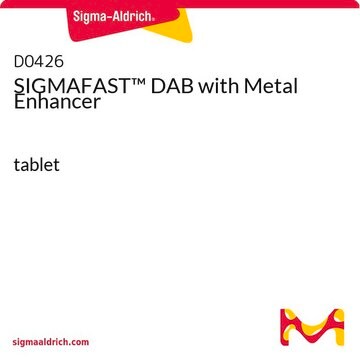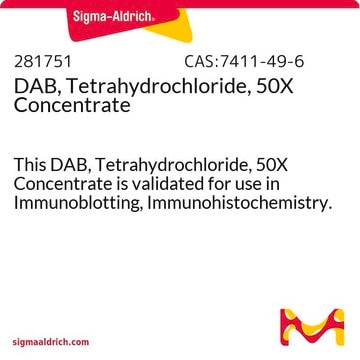D5905
3,3′-Diaminobenzidine tetrahydrochloride
peroxidase substrate, chromogenic, tablet
Synonym(s):
3,3′,4,4′-Biphenyltetramine tetrahydrochloride, 3,3′,4,4′-Tetraaminobiphenyl tetrahydrochloride, DAB
About This Item
Recommended Products
product name
3,3′-Diaminobenzidine tetrahydrochloride, tablet, 10 mg substrate per tablet
form
tablet
solubility
water: 1 tablet/15 mL (may contain small insoluble particles)
storage temp.
−20°C
SMILES string
Cl.Cl.Cl.Cl.Nc1ccc(cc1N)-c2ccc(N)c(N)c2
InChI
1S/C12H14N4.4ClH/c13-9-3-1-7(5-11(9)15)8-2-4-10(14)12(16)6-8;;;;/h1-6H,13-16H2;4*1H
InChI key
KJDSORYAHBAGPP-UHFFFAOYSA-N
Looking for similar products? Visit Product Comparison Guide
Related Categories
Specificity
Application
Biochem/physiol Actions
Reconstitution
Signal Word
Danger
Hazard Statements
Precautionary Statements
Hazard Classifications
Acute Tox. 4 Oral - Carc. 1B - Eye Irrit. 2 - Muta. 2
Storage Class Code
6.1C - Combustible acute toxic Cat.3 / toxic compounds or compounds which causing chronic effects
WGK
WGK 3
Personal Protective Equipment
Certificates of Analysis (COA)
Search for Certificates of Analysis (COA) by entering the products Lot/Batch Number. Lot and Batch Numbers can be found on a product’s label following the words ‘Lot’ or ‘Batch’.
Already Own This Product?
Find documentation for the products that you have recently purchased in the Document Library.
Customers Also Viewed
Articles
NBT-BCIP substrate system aids in western blotting and immunohistological staining, producing a blue-purple insoluble end product.
NBT-BCIP substrate system aids in western blotting and immunohistological staining, producing a blue-purple insoluble end product.
NBT-BCIP substrate system aids in western blotting and immunohistological staining, producing a blue-purple insoluble end product.
NBT-BCIP substrate system aids in western blotting and immunohistological staining, producing a blue-purple insoluble end product.
Our team of scientists has experience in all areas of research including Life Science, Material Science, Chemical Synthesis, Chromatography, Analytical and many others.
Contact Technical Service









